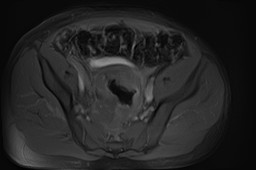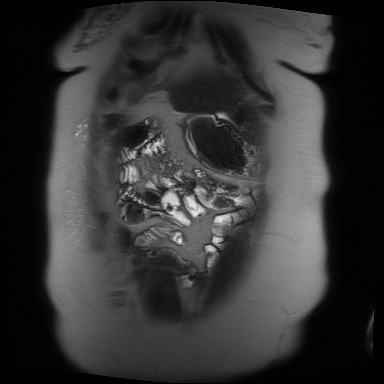Reid C Vegeler, MD, Anjali S Kumar, MD MPH. Section of Colorectal Surgery, Department of Surgery, Washington Hospital Center
Introduction: Small bowel tumors and other rare intestinal disorders are often exceedingly difficult to identify. Even cutting-edge technologies such as push enteroscopy and capsule endoscopy can fail to determine the cause of a patient’s symptoms. Magnetic resonance enterography (MRE) has become an increasingly reliable tool in the difficult-to-diagnose or difficult-to-monitor patient. At our institution, the use of MRE can replace capsule endoscopy or be utilized when traditional endoscopy and imaging fails.
Methods: We present a retrospective case series of three rare intestinal disorders from a prospectively collected database of 83 MREs in 66 patients. Patient #1 had a history of prolonged crampy abdominal pain and melena. Patient #2 was an HIV patient with a six-month history of rectal pain and new onset of mucousy stools. Patient #3 had been undergoing surveillance enteroscopies for a known diagnosis of Peutz-Jeghers syndrome.
Interventions and Results: MRE was performed after oral intake of water with psyllium fiber supplement. IV glucagon was used to eliminate bowel peristalsis and IV gadolinium was used for contrast after which pulse sequences were obtained. Patient #1 had abdominal pain and weight loss exceeding 22kgs within a six-month period. After CT scan showed only bowel wall thickening and mesenteric stranding, colonoscopy and push enteroscopy failed to find a source. However, by MRE, a 3 cm carcinoid tumor in the mesentery was diagnosed. Patient #2 underwent three lower endoscopies that showed non-specific inflammation. Ultimately, MRE demonstrated a rectal lymphoma which extended into the mesorectal fascia. Patient #3 underwent an MRE after developing anemia. The patient’s semiannual enteroscopies and flexible sigmoidoscopies had failed to demonstrate any new polyps, while a MRE found 7 small bowel polyps in the jejunum and ileum, the largest measuring 25mm and the smallest <10mm.


Patient #1 MRE Patient #2 MRE Patient #3 MRE
Conclusion: We demonstrate that MRE is a useful diagnostic modality in patients whose surveillance is difficult or to diagnose rare colorectal disease phenomena, colloquially referred to as “zebras”.
Session: Poster
Program Number: P155
View Poster
